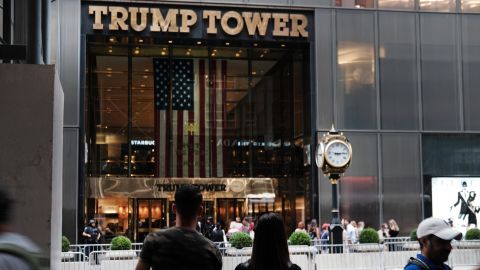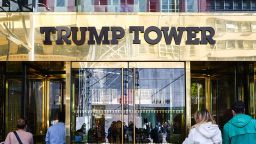Trump Org. closing arguments end after debate over role of former president

Closing arguments ended Friday in the criminal trial of the Trump Organization with New York prosecutors urging the jury to put aside politics and the company’s namesake and focus simply on the fraud allegations against it – despite accusing Donald Trump of knowing about the schemes in real time.
The jury is expected to begin deliberations on Monday, but before court ended Friday, defense attorneys moved for a mistrial after prosecutor Josh Steinglass told the jury that Trump must have known about the tax crimes and “sanctioned” some of them.
“This whole narrative that Donald Trump is blissfully ignorant is just not true,” Steinglass argued.
Defense attorney Michael van der Veen argued the jury was irreversibly prejudiced by comments suggesting Trump and his kids were unindicted co-conspirators. They have not been charged with any crimes.
Judge Juan Merchan sustained a defense objection during the prosecutor’s closing argument when Steinglass tried to tell jurors “Mr. Trump is explicitly sanctioning tax fraud.”
Steinglass suggested that Trump authorized tax fraud, showing a document in evidence signed by Trump to approve a salary reduction for a chief operating officer by the amount of the annual rent for his luxury Park Avenue apartment. The document does not explicitly say it’s for the apartment rent but the reduction was for the exact amount of the annual rent established by evidence at trial.
Former Trump Org. CFO Allen Weisselberg had testified on cross examination at trial that he did not conspire or scheme with any members of the Trump family – only company executive Jeff McConney.
Outside the presence of the jury, Steinglass walked back the accusations against Trump, saying the prosecution has not changed their case theory that the executives – Weisselberg, McConney and Matthew Calamari Sr. – allegedly committed the crimes.
Merchan ultimately denied the mistrial motion but offered to give the jury a limited instruction characterizing the issue when they’re charged with the case Monday.
Alan Futerfas, an attorney for the Trump Payroll Corporation, said, “He’s making a speculative assumption that is not supported or grounded in the testimony of two of the witnesses the people called.”
The judge had flagged the issue Friday morning and ruled that the prosecutor could suggest that Trump and his sons knew about the schemes in real time at least to an extent to combat the defense argument that a few high-level executives went rogue with their tax schemes betraying the Trump family.
At the time Merchan cautioned the prosecution, “You are not to infer or suggest that Mr. Trump should be sitting at the defense table.”
In closing his nearly four-hour summation, Steinglass told the jury that laws apply to everyone but don’t let politics distract them during deliberations.
“No one, no person and no corporation is above the law. The rules apply to everyone,” said Steinglass, calling it a “garden variety tax case.”
“Put aside the elephant that’s not in the room,” Steinglass said. “This case is not about politics. It’s just two corporations helping its executives cheat on their taxes.”


No comments:
Post a Comment